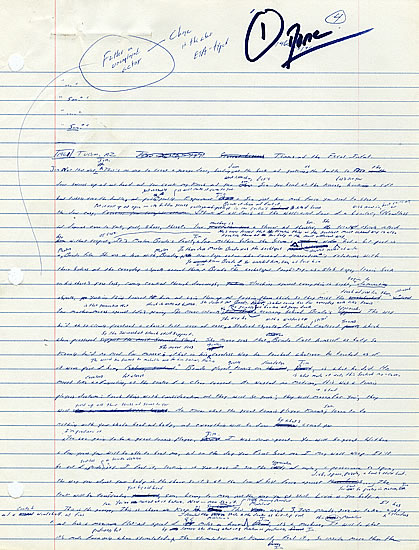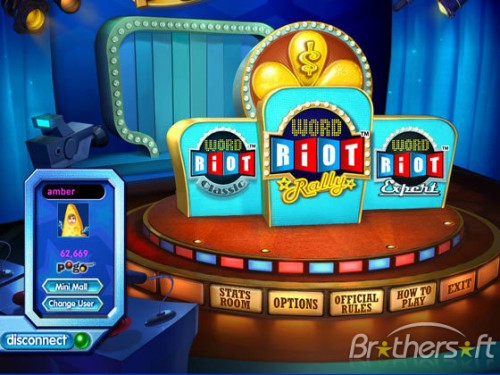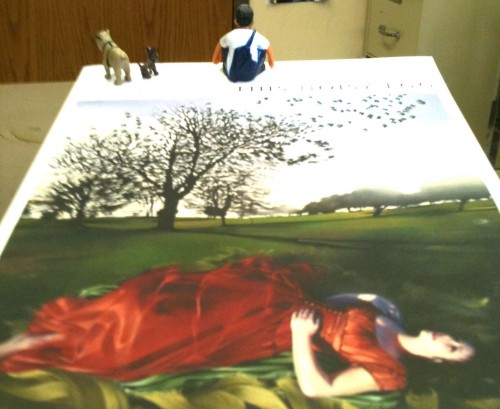Bataille’s Lone TV Interview: On Lit & Evil (1958)
September 14th, 2010 / 2:05 pm
David Foster Wallace Archives
The Wallace archives open today at the Ransom Center at the University of Texas at Austin. Included are more than 100 books he owned, often annotated, and other papers, such as this handwritten draft of the first page of Infinite Jest:

I still feel slightly conflicted over the whole nature of archives, and particularly certain natures of ones, but regardless, there probably haven’t been many days in the last eight to ten years that Wallace hasn’t somehow crossed my mind. Today should be no exception.
Alumni Night at the Roundup

My old New School buddy, Melissa Petro, has an op-ed up at the Huffington Post about the closing of the Craigslist adult services section- Thoughts from a Former Craigslist Sex Worker. Also, you might remember Melissa’s previous piece about sex work, “Not Safe For Work,” which appeared on The Rumpus.
One of the classes Melissa and I took together at New School was a seminar on the 20th century novel, taught by Dale Peck. Dale is 1/5 of a new publishing collective called Mischief & Mayhem, whose site went live just today. From their hot, fresh statement of purpose:
The collective came together in response to the increasingly homogenized books that corporate publishers and chain retailers have determined will sell the most copies. We recognize that there are readers who want to be challenged instead of placated.
The other four M&M-ers, by the way, are Lisa Dierbeck, Joshua Furst, DW Gibson and Choire Sicha. The collective seems to have a raft of events and projects planned, and will bring books into the world as an imprint of O/R Books, publisher of the Collected Fictions of Gordon Lish (see our sidebar ad) and Eileen Myles’s Inferno: A Poet’s Novel.
Another school-friend of mine, our own Amy McDaniel, has a fantastic essay in the new issue of Tin House. The theme of the issue is “Class in America” and it’s a doozy from start to finish–there are stories by Benjamin Percy and Charles Baxter, an excerpt from Lydia Davis’s new translation of Madame Bovary, poems by Major Jackson and Sarah Gambito, an interview with Luc Sante, A.N. Devers visits Poe’s house(s), and a whole lot more. I am enjoying this thoroughly & recommend it heartily.
And finally, there’s a new installment of Poets off Poetry, a series edited by Jackie Clark and published on Coldfront, which is run by Graeme Bezansen, John Deming & Melinda Wilson–New Schoolers all. In this POP-isode, Mathias Svalina (who did not go to NS, but looooves someone who did) writes about the time he listened to Side A of David Bowie’s Hunky Dory for a week straight.
avant-gagarde
Camille Paglia says:
If avant-garde is advanced guard, or vanguard, is Lady Gaga indeed avant-garde?
Mooney, (it dissolved into the salt), freed.

We are all of the same tribe. We all wear the same markings. The book is, in one way, a family portrait: a portrait of our tribe. There are obviously many people missing from this portrait, but that makes sense to me. Someone is always missing. –Blake B. interviews Chris Higgs at Bookslut, and says this: ‘The Complete Works of Marvin K. Mooney seems to me unprecedented via form, making new ways of both telling a story and relaying information, but also doing so in a way that is, as David Foster Wallace so expressly begged for: fun.’
If you’re on Goodreads, you can win Mooney with one click.
And the Marvin K. Mooney Society is redesigned and alive. Buy the book in September and you’ll get a book from Mooney’s library.
“At age eleven, McGraw discovered his birth certificate while searching his mother’s closet to find pictures for a school project.”
 All history is alternative history. But some history is more alternative than others. But some history is altercation with Others. What I really mean to say is every history has little moments that are suggestions into other stories for purposes of maximizing the story’s use of your storymaking brain. Things that “make the world” of the story “come alive.” Another way of thinking about this is that analogies often ask us to imagine some crazy shit. But only for as long as it takes to make the analogy work. For example, I’ve heard the chemical effect of coffee on the brain described as putting a brick under your brake pedal. “Okay, check.” We use our imagination to produce a feeling or an understanding (every image is its own feeling), and then we put that feeling/understanding in a suitcase and take it back to our original parameters. “Oh, coffee! So that’s how coffee works on the brain, okay.” Meanwhile, we’ve discarded the continuation of a very interesting (maybe?) story in its own right: driving around with a brick under your brake pedal. READ MORE >
All history is alternative history. But some history is more alternative than others. But some history is altercation with Others. What I really mean to say is every history has little moments that are suggestions into other stories for purposes of maximizing the story’s use of your storymaking brain. Things that “make the world” of the story “come alive.” Another way of thinking about this is that analogies often ask us to imagine some crazy shit. But only for as long as it takes to make the analogy work. For example, I’ve heard the chemical effect of coffee on the brain described as putting a brick under your brake pedal. “Okay, check.” We use our imagination to produce a feeling or an understanding (every image is its own feeling), and then we put that feeling/understanding in a suitcase and take it back to our original parameters. “Oh, coffee! So that’s how coffee works on the brain, okay.” Meanwhile, we’ve discarded the continuation of a very interesting (maybe?) story in its own right: driving around with a brick under your brake pedal. READ MORE >
Have you ever kissed another writer’s ass or falsely bestowed praise in hopes of getting something in return or making friends? Did it work? Did it make you happy? Feel free to respond anonymously.
I go to the beach. I ask what you are reading, your ‘beach book.’ 99.4 % of the time it is a novel. Why?
WORD RIOT HAVIN’ A CONTEST

contest!
Yo! Word Riot, publisher of me (oh and some other folks, like Mike Young and Paula Bomer and Kevin Sampsell), is having a contest. THREE contests. Poetry, flash fiction and short story. The winner of each will receive half the contest money (from their respective individual contest, I assume) and be published in the WR 10th anniversary anthology. They’ve also opened up submissions for the WR 10th anniversary anthology from authors previously published on the site. More info here: http://www.wordriot.org/archives/2019. I just got a galley of Paula Bomer’s book Baby this week and I’m gonna read it ASAP, like as soon as I finished this amazing Aldous Huxley book The Devils of Loudun that I got from the library. (Read this shit, it’s so good!)
listen: This Noisy Egg

Because when I go outdoors, light splits
up my head and super siren dogs
try to eat my balls.
1. Your book seems to me to be full of movement. Feather-minded bullets and clutch-curls and tilting sways and breezes and tickling groins. Discuss.
Poems should move. Sometimes, when I think of poems, they seem so blocky and static on the page. I think that’s one reason people resist them. In these poems, I tried to get some flight into them—partially from that high-minded notion that poems should move but also probably from some less honorable fear that the poems will get stuck somewhere and I won’t be able to move it out from there. Like swinging on the monkey bars, if you lose momentum, you fall down. I resist resolution in the poems for the same reason—that tied-up-in-a-knot feeling that makes poems feel so smart but also so done. If I fully resolved something in a poem, I don’t know how I’d write the next one.

